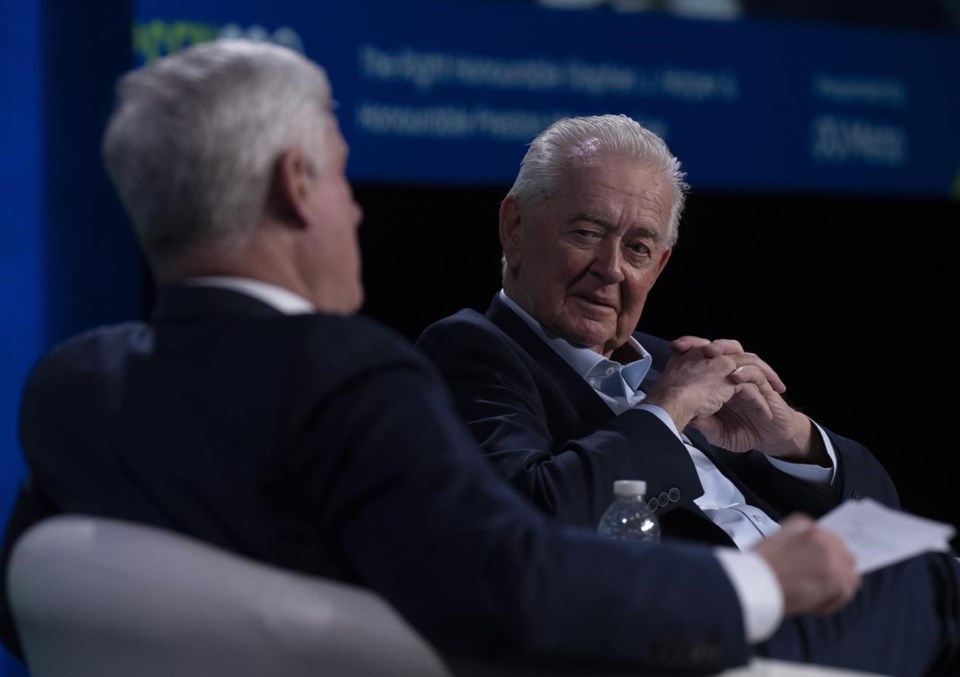EDMONTON — A panel studying Alberta’s pandemic response urges the province to consider “alternative” scientific theories — a recommendation the Opposition NDP says opens the door to fringe ideas akin to Premier Danielle Smith once advocating the use of a horse dewormer to fight COVID-19.
The report by the panel led by former Reform Party leader Preston Manning says science should still play a role in future crises, but only as part of a “balanced response” tied to “evidence-informed decision-making.”
It calls for the premier and cabinet to be the final decision-makers in any crisis response while drawing on the expertise of a chief science officer and a roster of professionals from a range of scientific and other fields.
“If the response measures include effects on the economy, effects on the social life in the community, educational effects (and) effects on rights and freedoms in the courts, you need a multidisciplinary science pool — not just one focused in the area where the emergency began,” said Manning in an interview.
The $2-million panel, struck by Smith in January, was tasked with making recommendations on how laws, regulations and organizational charts can be altered to help Alberta better prepare for a future pandemic such as COVID-19.
The report said different views need to be examined, tested, embraced or rejected because, as with all science, views and polices change as new information and testing come to light.
“Elected officials, the (Alberta Emergency Management Agency) and the subject matter ministry should be open to considering and investigating alternative scientific narratives and hypotheses,” wrote the panel.
The panel said these theories should be pursued "even at the risk of acknowledging some uncertainty as to which scientific narratives are most relevant to the emergency at hand.”
Smith’s responded to the report in a statement, saying: “No decisions have been made in response to the recommendations.
“Together with our caucus, we will review and analyze the report and consider the panel’s recommendations as we prepare for future legislative sessions.”
Opposition NDP Leader Rachel Notley said the report encourages the adoption of dangerous fringe medical theories that could put health workers in a bind if they are ordered to administer such treatments down the road.
“What you see is an invitation to normalize conspiracy theories and pseudo-science at the expense of evidence-based medical care,” Notley told reporters in Calgary.
Smith has publicly questioned the efficacy of COVID-19 rules and gathering restrictions, particularly when compared with the potential for long-term harms to mental and physical well-being.
Smith has also questioned the mainstream science approach to the pandemic and endorsed debunked COVID-19 treatments, such as horse dewormer ivermectin and hydroxychloroquine.
She embraced the Great Barrington Declaration, a theory that called for protecting the elderly and frail but otherwise letting COVID-19 run free to build up herd immunity.
On her first day in office, Smith announced chief medical officer of health Deena Hinshaw would be replaced and that Smith would take advice from a new hand-picked team of science advisers, which was never formed.
She later said she was keen to hear from Paul Alexander, an adviser to former U.S. president Donald Trump. Alexander dismissed COVID-19 vaccines as “bioweapons” and urged using herd immunity.
Justice Minister Mickey Amery introduced a bill earlier this month to explicitly grant decision-making authority to cabinet in public health emergencies.
Lorian Hardcastle, an associate professor in the Faculty of Law and Cumming School of Medicine at the University of Calgary, said she's concerned about that power being centralized in the hands of government.
"Under the current legislation the chief medical officer of health has a lot of power. This would really shift public health into government domain," Hardcastle said.
"If these recommendations were adopted, we would see an ideologically driven response to a public health emergency that would make it difficult to protect the vulnerable, to protect hospital capacity, to keep people alive."
Manning’s panel recommendations focus on amending rules to better organize decision-making in a crisis.
It urges reforms and changes to Alberta’s Bill of Rights, along with other laws, to ensure personal freedoms are better protected in a crisis.
University of Alberta law professor Eric Adams said having a conversation on how to handle a public health crisis is a good idea, but handing that review off to an individual who constructs a "one-sided narrative" doesn't serve the public.
"You certainly don't want, in the worst case scenario, somebody's partisan interests driving the province into a public health crisis because they don't believe in the science of communicable diseases."
This report by The Canadian Press was first published Nov. 15, 2023
— With files from Bill Graveland in Calgary
Dean Bennett, The Canadian Press



